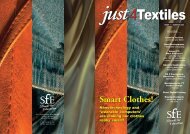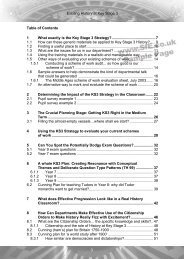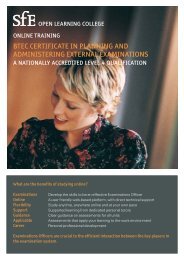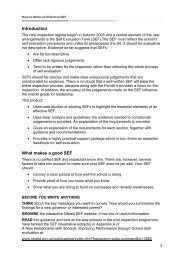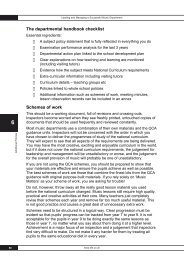Experiential RE supdocs.indd - SfE
Experiential RE supdocs.indd - SfE
Experiential RE supdocs.indd - SfE
You also want an ePaper? Increase the reach of your titles
YUMPU automatically turns print PDFs into web optimized ePapers that Google loves.
The important issue for raising academic attainment in <strong>RE</strong> is to set questions at the highest levels<br />
in order to enable pupils to reach them and to develop their critical, analytical and evaluative<br />
skills. Government inspections have shown that, in the past, <strong>RE</strong> has not been good at doing<br />
this. There have been far too many low level activities, eg drawing, colouring and poster work,<br />
accompanied by short descriptive written work. The levels have enabled all of us to think hard<br />
about the questions we ask pupils to respond to.<br />
Theatre of Learning lesson recipes are all accompanied by structured, levelled writing frames and<br />
essays. The multi-sensory, experiential and enactive techniques used by the Theatre of Learning<br />
develop a deeper understanding and provide a more effective basis from which to evaluate the<br />
effect of belief, ritual and ceremony than the use of textbooks alone. They motivate pupils to read,<br />
research and write at higher levels than they would otherwise have attempted.<br />
I have summarised the levels in my resource files so that they can be a useful tool for teachers<br />
and pupils in discussion about written work.<br />
Level Three (average attainment for age 7) facts<br />
Level Four (average attainment for age 11) why and because<br />
Level Five (average attainment for age 14) the effects of religion upon an individual, a family or<br />
a community<br />
Level Six (attained by many at age 14) the variety of belief within a tradition<br />
Level Seven (attained by some at age 14) critical analysis<br />
Level Eight (attained by a few at age 14) comparison between traditions,; development of a<br />
tradition through history<br />
Answering the more difficult evaluative GCSE questions is so much easier for pupils when they<br />
are writing about experiences they actually took part in.<br />
After being taught using Theatre of Learning techniques, pupils are able to deal so much<br />
more effectively with Level Five questions about the effects of religion upon a person, family<br />
or community, Level Six questions about the variety of belief within a tradition, Level Seven<br />
questions requiring critical analysis, and Level Eight questions about the comparison between<br />
traditions, because the answers will come partly from their own experience and reflection, as well<br />
as being accompanied by real, motivated thinking and research.<br />
Joe, a very bright and articulate 16 year-old, was coming up to GCSE exams when he made the<br />
following statement. He was supported by Helen, also very bright. They both planned to read<br />
philosophy at University. They studied <strong>RE</strong> to A Level. Now graduates in English, they argued<br />
forever about which one of them made the statement to a research student who had come to look<br />
at our way of working:<br />
“In my other lessons, everything just goes straight out of my head the moment I walk<br />
out the door, I have to look back over my books to remember what I have learned, but<br />
<strong>RE</strong> is a memory, it becomes part of your life.”<br />
What they were saying is that these lessons affected them and changed them as they<br />
experienced, imagined, reflected, became aware and articulated; it was so much more than<br />
information learned from a book. This is what we need to do to bring the citizenship dimension of<br />
our work alive in whatever area of the curriculum we are working. Here is an example:<br />
In the early days I discovered the transformative power of this way of working almost by accident.<br />
After a lesson in which pupils were asked to think about a relationship that needed healing in<br />
preparation for a GCSE examination question on the effects of prayer on Christians, I invited<br />
6 <strong>Experiential</strong> <strong>RE</strong>: Supporting documents



